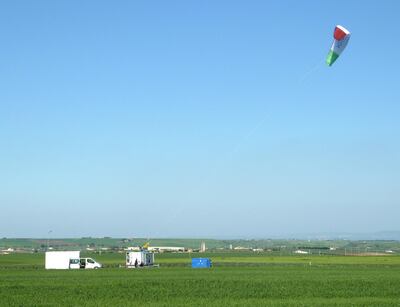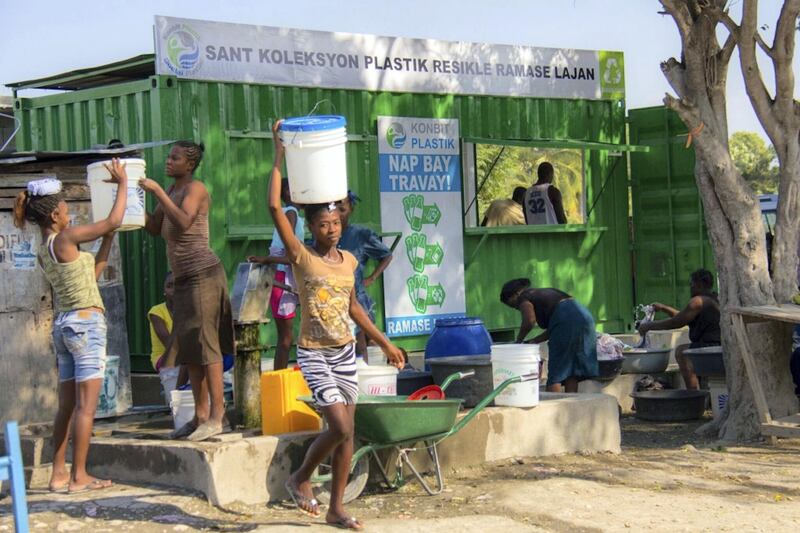From collecting plastic bags to fund schooling to experimenting with kites to harness energy, Expo 2020 is taking its message of recycling and reuse overseas.
As part of Sustainability Week this week it was announced that 13 projects with a sustainability theme have received a $100,000 (Dh367,300) Expo Live grant for programmes designed to create widespread social change. The money will be used to develop concepts that include reusing waste, creating alternatives to plastic bags and bringing electricity to remote areas.
“We want to push Expo Live as an incentive for youth and entrepreneurs who are spending time thinking of how to solve problems in waste, water and energy,” said Yousuf Caires, vice president of Expo Live, Expo 2020 Dubai.
The first programme of its kind undertaken at a world fair, Expo Live aims to show how grassroots enterprise adds social value and can create change making the world a more inclusive place. With funds of US$100 million, it is an innovation and partnership programme launched by Expo 2020 Dubai to fund, accelerate, and promote creative solutions that improve lives while improving the environment.
“We want people to know there are programmes like ours interested in funding their ideas. We want them to pursue their ideas and not be discouraged by a lack of funding, interest or support,” said Mr Caires.
A grant of a $100,000 (Dh367,300) is available to winners of Expo Live with the assurance that the expo will fund further innovations. The programme opens for applications every six months in the run up to the event and the third round ended last December, with results likely in April.
In Haiti, as part of the Plastic Bank scheme, people collect plastic waste and hand it into stores. It is then recycled and sold to companies for use in manufacturing and the money pays for the school fees of the children of those who collect the plastic.

“A group of entrepreneurs are helping connect people who collect plastic with companies. With the Plastic Bank, those collecting the plastic make a commitment. That’s why it’s called a bank, because through its resources it supports families to keep kids in school,” Mr Caires said.
Finnish company Paptic has developed a wood-based alternative to plastic packaging and bags to cut waste. They aim to develop new applications for use beyond shopping bags.
“This project of scientific research requires rigorous experimentation and we can have real impact on the ground. This renewable source of fibre can be as strong as plastic and as malleable as paper,” he said.
Due to patenting reasons, Paptic declined to talk about the details of their new material.
Kitenergy is an Italian firm using kites to capture high-altitude wind, aiming to provide power to remote areas with little or no access to electricity. The Expo grant will allow Kitenergy to conduct field tests on a remote island in Cape Verde off the north west coast of Africa. It could give 200 residents there access to electricity and power a desalination plant.
“The grant will help us run tests in real life in marginalised islands in west Africa that may not have many options. It requires more experimentation, but it can be an alternative for those with no access to the grid to help them generate their own source of energy,” he said.
Among projects funded in the UAE is the Smart Labour mobile phone app, which helps blue-collar workers speak in English and learn safety information in their own language via video tutorials they can access on their mobile phones at any time.
__________
Read more:
[ Two schools could win Dh1m of solar panels in Sustainability Champions competition ]
[ Dubai Expo 2020: All you need to know ]
[ Expo 2020 marks three years to go as it champions life-changing innovation ]
_________
A separate university innovation programme is open specifically to UAE students for a prototype they want to improve.
Funds of up to Dh25,000 were awarded last year by Expo 2020 to 19 groups of university students in Abu Dhabi, Dubai and Sharjah. More than 1,000 students in 280 teams from public and private colleges participated in 2017. The programme will continue this year.
“More than half the applications were around sustainability so water, energy, waste and recycling was on top of their minds,” Mr Caires said.
“It’s an opportunity for UAE students to tell us what they are working on and for them to showcase their best,” he said.
Conservation fits in with the UAE’s efforts as a country, said Najeeb Mohammed Al-Ali, executive director of the Expo 2020 Bureau.
“Sustainability is the cornerstone of the Expo and also fits in with the UAE theme this year in the Year of Zayed,” he said.
“One of the four pillars of the Year of Zayed is sustainability. If we think of this country’s history and our early years, there was always an emphasis on this. The Expo programmes are a chance for us to take it to the next level.”





